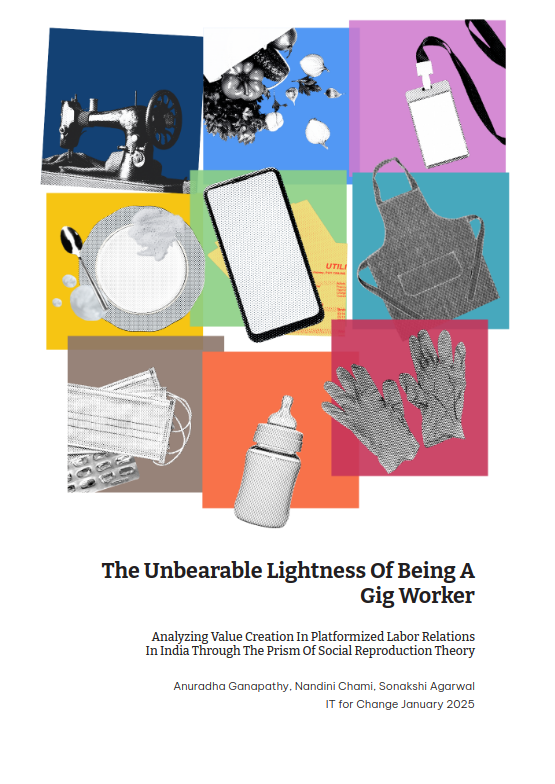Thematic Highlights
Future of Work and Workers’ Rights
We deepened our inquiry into how data-driven management practices reinforce intersectional discrimination and exclusion in the labor market. Centering our efforts on advancing algorithmic transparency and accountability, we actively contributed to shaping global debates on decent work in the platform economy, particularly in the run-up to the International Labour Conference 2025.
 KEY MILESTONES
KEY MILESTONES
- Contributed to platform work regulation at the state level: As core members of a civil society working group, we helped draft key provisions on algorithmic transparency in the proposed ‘Karnataka Platform-based Gig Workers (Social Security and Welfare) Bill, 2024’
- Advocated for decent work at the ILO and Beijing+30: We co-convened a series of consultations examining how the platform economy deepens inequalities of gender, class, geography, and race. In collaboration with Public Services International (Asia-Pacific), we contributed to the yellow report of the International Labour Organization (ILO) on decent work in the platform economy.
- We also co-organized a formal CSW69 side event, ‘Gender Equality in the Platform Economy: Evolving a Policy Agenda for Beijing+30’, where we launched our research report exploring the barriers to building feminist futures of work in the platform economy.
- Shaped narratives on designing fair and inclusive platform workplaces: We engaged in global discussions on how social and solidarity economy entities can harness the platform economy to create equitable and inclusive workplaces. At panels such as ‘Social and Solidarity Economy and Workers' Rights and Conditions in Digital Labour Platforms’, we showcased examples of platform cooperatives—democratically owned and governed digital platforms emerging across the Majority World.
 WHAT’S ON THE HORIZON?
WHAT’S ON THE HORIZON?
- Closely engaging in the International Labour Conference 2025 deliberations on decent work in the platform economy, including co-organizing a side event with grassroots movements and worker organizations.
- Launching our research report on algorithmic assemblages at the workplace in India, developed in collaboration with the National Law School of India University (NLSIU).
Recommendations from the Vault
- Access our report, ‘Pathways to Gender Equality in the Platform Economy: A Policy Agenda for Beijing+30 and Beyond’, unpacking the concept of “flexploitation” in gig work.
- Read our paper, ‘The Unbearable Lightness of Being a Gig Worker: Analyzing Value Creation in Platformized Labor Relations in India Through the Prism of Social Reproduction Theory’, examining how digital labor platforms extract and organize value.
Dismantling Big Tech
As Big Tech’s harms grow more pervasive, we have intensified efforts to challenge its dominance. Through coalitions such as Break Open Big Tech and Digital Merger Watch, we actively track Big Tech’s monopolistic and anti-competitive practices across markets. As co-chair of the Break Open Big Tech working group, we shape collective strategies, respond to major merger announcements, and engage with key regulatory developments in India and beyond.
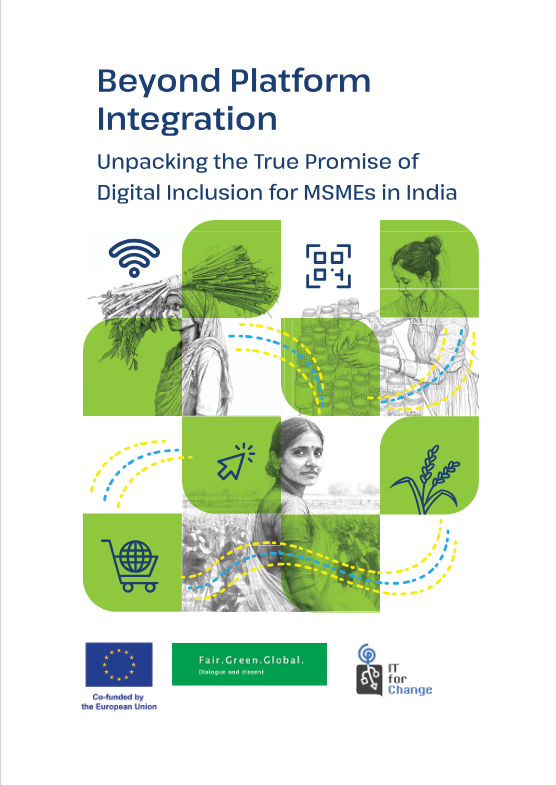
 KEY MILESTONES
KEY MILESTONES
- Shaped national policy on fairer platform marketplaces: We responded to public consultations on the draft Digital Competition Bill, urging a regulatory framework grounded in evidence and transparency that empowers the Competition Commission to act effectively.
- Drove global civil society action against corporate capture: We joined a global civil society campaign addressing the corporate capture of the multilateral system. At the UN Summit of the Future in September 2024, we co-organized a press conference with the People’s Working Group on Multistakeholderism titled, ‘Who Gets to Define the Future?: The UN’s Summit of the Future as a Mechanism for Corporate Capture’. Our intervention highlighted Big Tech’s growing power and the global governance deficits in digital capitalism.
- Challenged corporate power and monopolies: Through the Global Anti-Monopoly Convening and the Digital Merger Watch network, we questioned the concentration of financial and infrastructural power in Big Tech. Alongside a coalition of civil society organizations, we submitted an input to the European Competition Commission, urging an investigation of the Nvidia/Run:ai merger, citing risks of reinforcing monopolistic control over the global semiconductor supply chain.
 WHAT’S ON THE HORIZON?
WHAT’S ON THE HORIZON?
- Launching a research study with the Break Open Big Tech group to design safeguards in public procurement policies that prevent Big Tech capture of core digital systems.
- Expanding our work with Digital Merger Watch to advance effective antitrust tools for the digital economy.
Recommendations from the Vault
- Read our paper, ‘Beyond Platform Integration: Unpacking the True Promise of Digital Inclusion for MSMEs in India,’ highlighting the challenges and opportunities for micro, small, and medium enterprises to participate meaningfully in India’s platform economy.
- Read our whitepaper, Beyond Big Tech: A Framework for Building a New and Fair Digital Economy, on dismantling Big Tech's concentrated power over digital ecosystems.
Data and AI Governance
As the digital revolution reshapes economies and societies, we focus on building an integrated data and AI governance agenda that prioritizes rights and structural justice. This year, we intensified advocacy on AI governance and led cross-border research to advance justice in data governance. Our work targeted the global political economy of data and AI, aiming to strengthen equity, accountability, and inclusive digital futures.
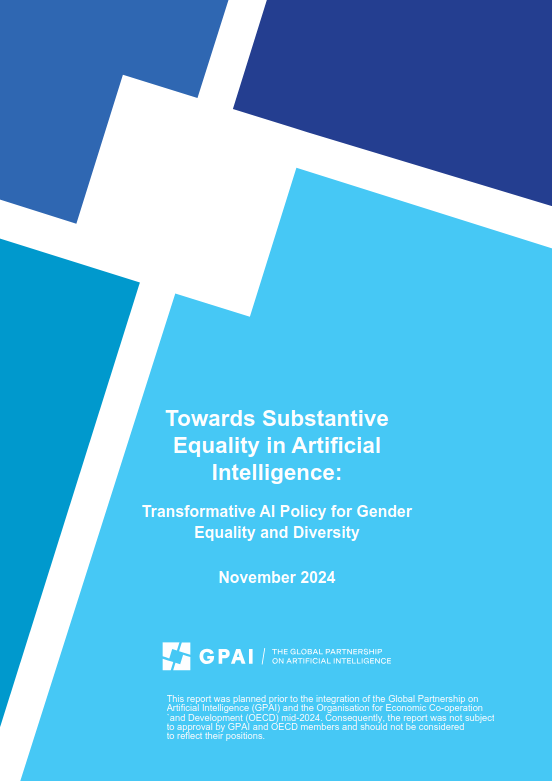
 KEY MILESTONES
KEY MILESTONES
- Influenced global AI governance at the UN: We contributed two cutting-edge inputs to the UN AI Advisory Body’s report on a new global governance framework for AI. One highlighted the shortcomings of the current Intellectual Property Rights regime in enabling fair and democratic AI and data innovation. The other called for integrating a critical gender equality perspective into global AI governance frameworks.
- Advanced sectoral pathways to data justice: Through the Data Justice Research Project, a multi-partner initiative, we are working on co-developing a pro-South, sector-specific vision for data justice. Engaging with civil society actors and people’s movements across health, biodiversity, food, and open data sectors, the project is documenting concrete economic, social, and cultural rights (ESCR) violations arising from digitalization and datafication.
- Set the global agenda on AI-related risks: We responded rapidly to key policy discussions on safeguarding against data and AI harms. We provided expert inputs to the OECD Global Partnership on AI report on fostering substantive equality in AI innovation ecosystems.
- We also responded to the Office of the United Nations High Commissioner for Human Rights (OHCHR) call for inputs on its thematic report, ‘The Use of Artificial Intelligence and the UNGPs’. Our joint submission with the Global Digital Justice Forum highlighted critical human rights risks from AI procurement and deployment by states and businesses across sectors, including law enforcement, welfare, and health.
 WHAT’S ON THE HORIZON?
WHAT’S ON THE HORIZON?
- Finalizing project partners’ case studies and the synthesis report for the Data Justice Research Project.
- Continuing to shape UN CSTD Working Group processes on data governance and contributing to policy recommendations.
- Launching a new research and policy agenda on Regenerative AI economies in the Global South.
Recommendations from the Vault
- Read the GPAI Report on Substantive Equality and AI, which strengthens states’ capacity to foster inclusive, equitable, and just AI ecosystems.
Information Integrity
In a corporate-controlled digital media environment, we prioritize feminist and intersectional frameworks to tackle pressing issues of content regulation and information integrity. Over the past year, we translated these priorities into tangible impact through targeted research, policy engagement, and advocacy interventions.
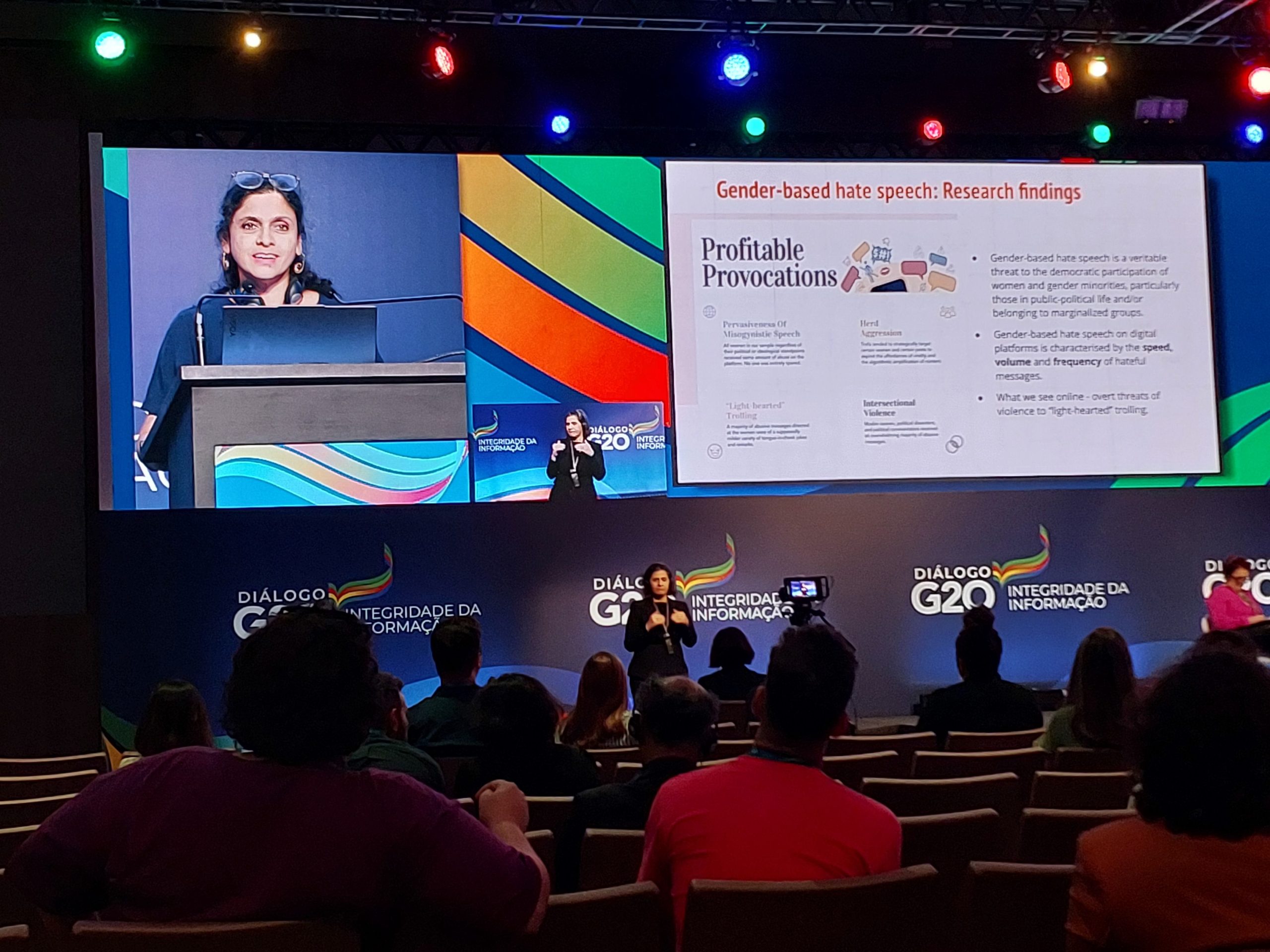
 KEY MILESTONES
KEY MILESTONES
- Led a Gender-Responsive Information Integrity Agenda at G20 Brazil: To counter misogyny, gendered disinformation, and incitement of violence, we co-authored the T20 Policy Brief, ‘Gendering the G20 Information Integrity Agenda’. The brief calls for legal recognition of gendered disinformation and gender-based hate speech. It also outlines key elements of a model platform regulation framework, including techno-design changes.
- Furthered democratic integrity agenda in the digital public sphere: We contributed to the OECD Draft Recommendations on Information Integrity, advocating for the highest standards aligned with democratic values of equality, liberty, solidarity, and verity/public reason.
Through the UNESCO Internet for Trust Knowledge Community, we submitted comments on the ‘UN Framework for Human Rights Risk Assessment (HRRA) in the Context of Online Safety of Critical Voices’. Our inputs emphasized mapping the links between social media business models and the spread of viral disinformation that threatens human rights defenders, particularly women and gender minorities.
 WHAT’S ON THE HORIZON?
WHAT’S ON THE HORIZON?
- Launching a book project on gender and the digital public sphere in India with Zubaan Books. The project will begin with a call for essays.
- Deepening engagement with civil society networks, including the Forum on Information and Democracy and Internet for Trust Knowledge Community, to advocate for information integrity and probe digital platform governance issues.
Recommendations from the Vault
- Check out DataSyn’s year-end issue, ‘The Circuits of Information in the Year of Elections, ’ exploring information integrity and reclaiming the digital commons.
Digital Public Infrastructures
Digital public infrastructures (DPIs) are increasingly promoted as solutions to improve public service delivery. This year, our research and advocacy examined how digitalization shapes critical sectors such as healthcare and agriculture, and how the state can enable ethical innovation. Our goal was to understand how DPIs and the surrounding innovation ecosystem can be designed and implemented to maximize public value, ensure accountability, and democratize digital economies.
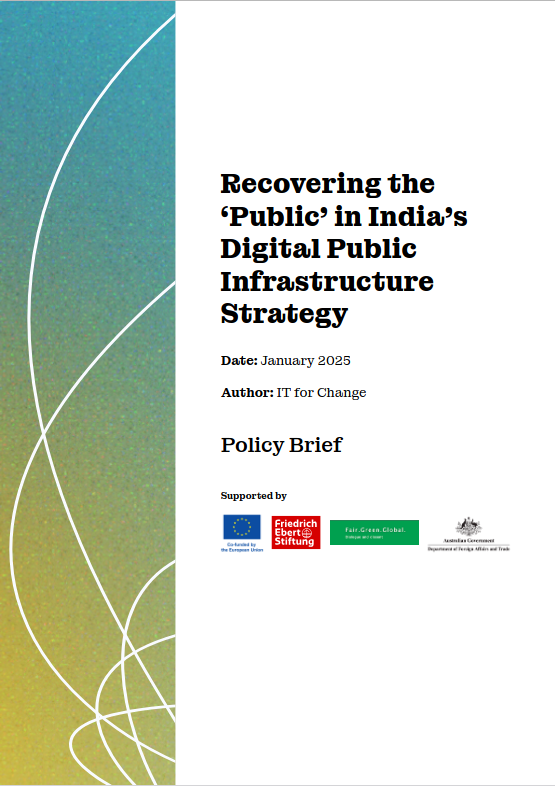
 KEY MILESTONES
KEY MILESTONES
- Engaging with UNESCO’s Model Law on Platform Accountability: A major facet of our research focused on safeguarding freedom of expression and access to information online. We engaged with UNESCO, providing detailed feedback on Draft 2.0 of its ‘Guidelines for Regulating Digital Platforms,’ calling for stronger application of the UN Guiding Principles on Business and Human Rights, particularly for platform accountability in the Global South.
In public consultations on the UN Global Digital Compact, our advocacy emphasized bounded openness to preserve DPIs’ public value and prevent capture by a few platform monopolies. We also called for a robust human rights–based governance framework for DPIs.
- Spotlighted issues of exclusion in Digital Welfare Access: Building on our research on India’s health sector DPI and its impact on citizen access to universal healthcare, we shared evidence highlighting the need for guardrails to prevent rights violations and exclusion in digital public health systems at RightsCon 2025 in Taipei. We also engaged with the G20 Brazil T20 Group to develop a policy roadmap for digital public goods in health service delivery.
 WHAT’S ON THE HORIZON?
WHAT’S ON THE HORIZON?
- Designing a model framework on ‘Steering Digital Innovation Policy Towards Public Value Maximization’ with the University of Western Australia. The framework will offer policymakers guiding principles to center public value in innovation practices.
- Publishing sectoral case studies examining India’s DPI strategies in healthcare, agriculture, and urban mobility.
Recommendations from the Vault
- Read our policy brief, ‘Recovering the ‘Public’ in India’s Digital Public Infrastructure Strategy,’ highlighting the emergence of a clientelist digital welfare state.
- Check out our policy brief, ‘Reorienting Public Services Platformization in Health’, examining the pitfalls of techno-deterministic digitization and the commodification of healthcare and patients.
- Read our policy brief, ‘Advancing Health Data Governance for Societal Well-being: A Perspective on Health Digital Common Goods for the G20,’ advocating a health data governance policy to ensure equitable distribution of economic and health benefits from data use.
EdTech Innovations from the Field
This year, our work at the intersection of education and technology advanced language acquisition, digital literacy, and teacher empowerment. We integrated technology directly into classrooms, strengthened teacher professional development, and forged collaborations for systemic education research. Our workshops and programs applied innovative approaches to ensure meaningful technology integration in teacher professional development.
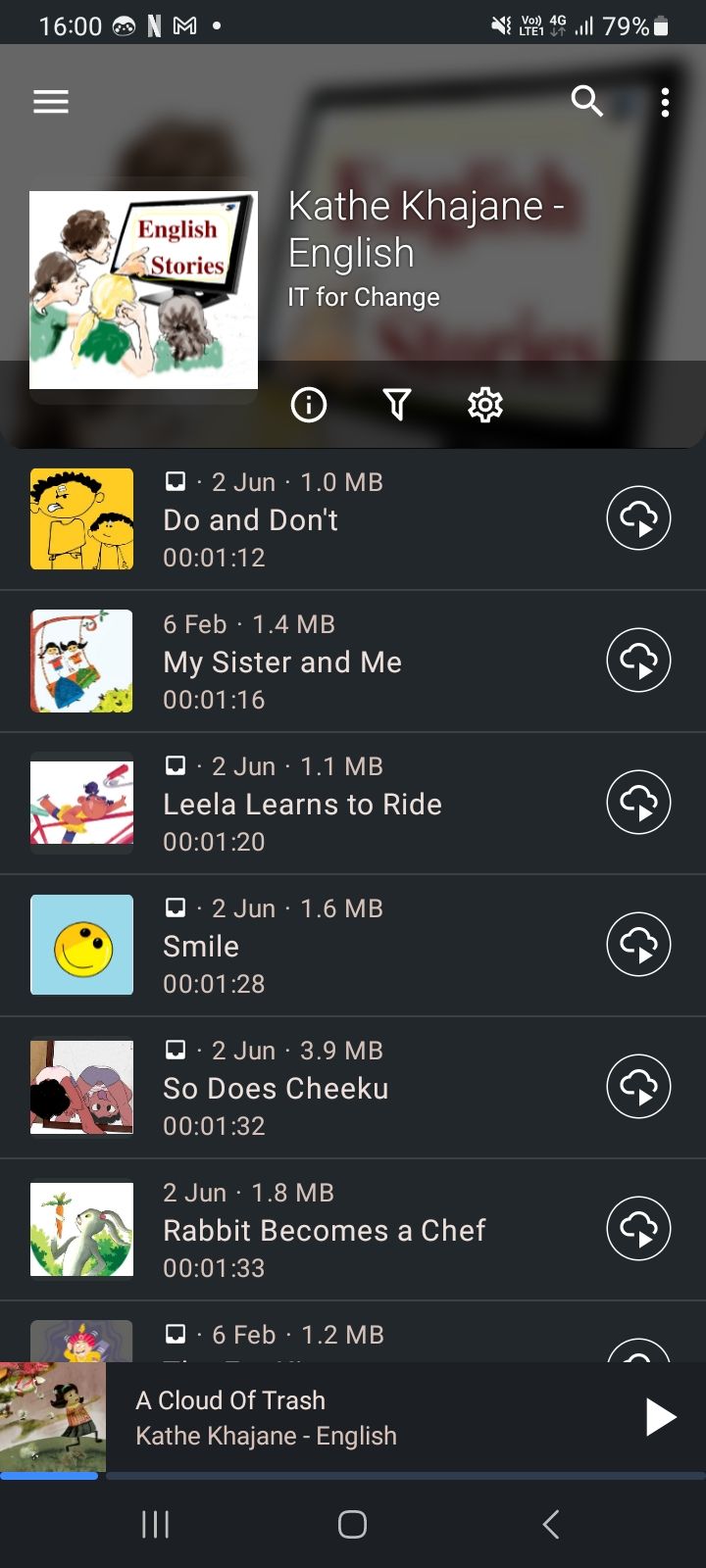
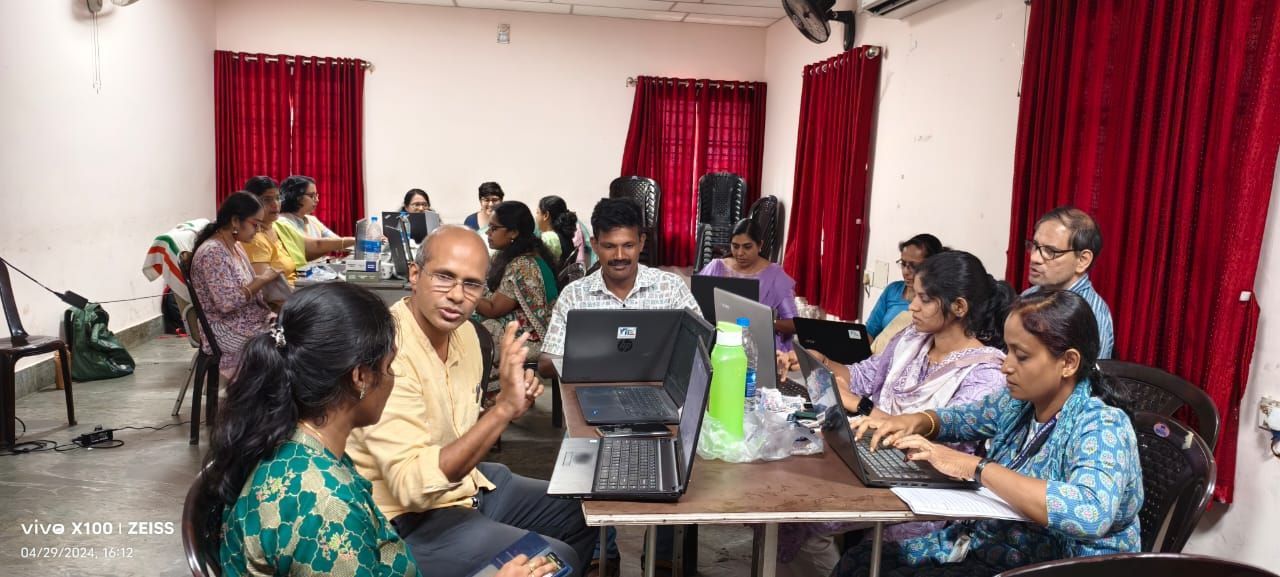
 KEY MILESTONES
KEY MILESTONES
- Strengthened the audio stories program: The ‘Karnataka Language Education through Audio Stories Program’ (K-LEAP) trained teachers to integrate audio stories into classroom practice through techno-pedagogy workshops across six districts. Workshops addressed the needs of Tamil, Telugu, and Urdu medium government primary school teachers, who often have limited professional development opportunities in Karnataka.
- We also launched the ‘Jharkhand Language Education through Audio Stories Program’ (J-LEAP) in Early Childhood Education, in partnership with Collectives for Integrated Livelihood Initiatives (CInI). This marked LEAP’s expansion to Jharkhand, supporting Mundari, a prominent tribal language.
- Propagated digital literacy in schools: This year, our digital literacy work culminated in the ‘Digital Picture Story Creation program’ at a Bengaluru school, where parents and teachers saw students confidently speak in English and present digital artifacts they had created on school computers. The Technology Integration for Equitable Education (TIEE) project also expanded beyond Bengaluru to the Mysuru district, reaching rural, socio-economically disadvantaged blocks in HD Kote and Hunsuru, in partnership with the Mysuru District Institute for Education and Training (DIET).
- Collaborated with the Karnataka State Education Department: The Department of State Education Research and Training (DSERT), Karnataka, invited us to guide research projects across multiple educational areas. We contributed to tool design, data collection, analysis, and report preparation. Our capacity-building workshops with DIETs provided hands-on experience for participants, strengthening local research and implementation skills.
- Expanded into social science pedagogies: We launched the Social Science through Information Technology in Education (SOSITE) project in partnership with Avehi Abacus, marking our strategic expansion into social science teaching, building on prior work in language and math education.
- Our Director and Lead for Education and Technology, Gurumurthy Kasinathan, contributed to four Task Force reports commissioned by the Karnataka State Education Policy Commission, covering Right to Education, Adult Education and Lifelong Learning, Curriculum Framework, and Teachers’ Qualifications and Working Conditions. He also reviewed the Task Force report on the Structure of School Education, addressing enrollment, retention, and educational attainment challenges for socially and economically disadvantaged groups. The Commission’s report has been submitted to the Government of Karnataka.
- Strengthened knowledge-creation: We presented two papers: ‘Formal vs. Substantive Activity-Based Learning – A Tale of Two School Events’ and ‘Supporting Inclusion in Government School Through Universal Design for English Language Teaching’—at the 14th Annual International Conference of the Comparative Education Society of India (CESI) in Chandigarh. We also participated in a panel discussion, ‘EdTech – Looking Beyond the Hype’, examining meaningful technology integration in education.
- Empowered teachers with technology: Through ongoing collaboration with pre-service teacher education institutions, we offered customized versions of our EdTech Integrated learning program. Aligned with National Curriculum Framework themes of ‘Connecting and Learning and Creating and Learning’, the course enhances student-teachers’ ability to integrate technology effectively into their teaching practice.
 WHAT’S ON THE HORIZON?
WHAT’S ON THE HORIZON?
- Conducting workshops to build teacher educator capacities in EdTech-integrated teaching and learning practices and providing academic and administrative support.
- Implementing techno-pedagogy workshops in Jharkhand and Odisha for CInI resource persons and Anganwadi teachers, focusing on integrating audio stories into the teaching of tribal languages.
- Publishing statewide research reports on Mathematics, Language, and Science Education, conducted with Karnataka’s DSERT.
- Developing and piloting the ‘Social Science Education with Technology Integration’ module.
Recommendations from the Vault
- Read our article ‘How Theatre Techniques Can Help Students Learn’, exploring the transformative potential of theatre in language teaching.
- Read our article ‘When Teachers Learned the Art of Writing’, presenting outcomes from the teachers’ writing workshop conducted in Thrissur, Kerala.
Critical EdTech
We have been working on advancing critical perspectives on EdTech through research, advocacy, and community building. By launching the Critical EdTech India (CETI) network, conducting action research on Teacher Professional Development (TPD), and engaging with national and global education debates, we emphasized equity, strengthened teacher agency, and promoted open, public models of technology in education.
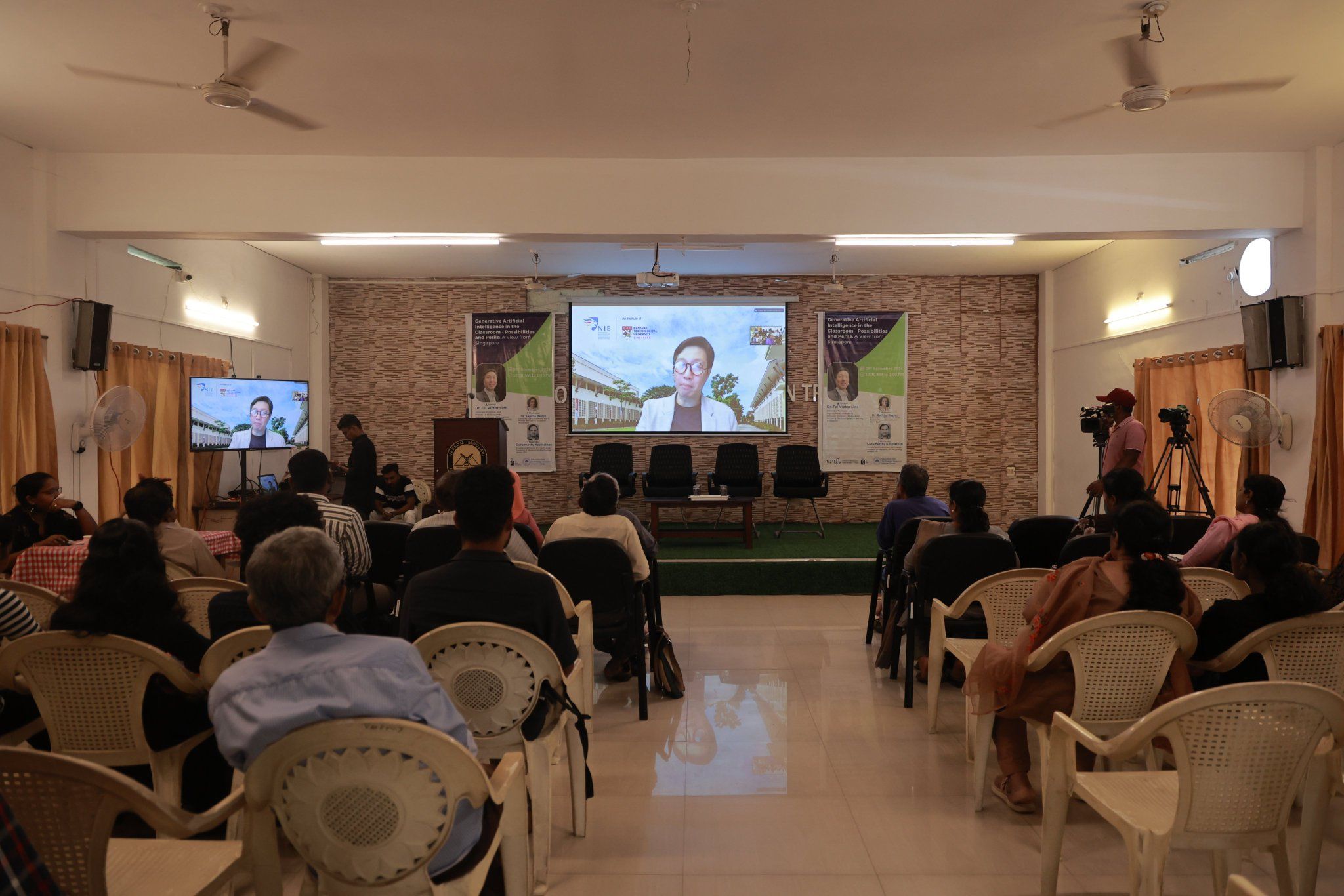
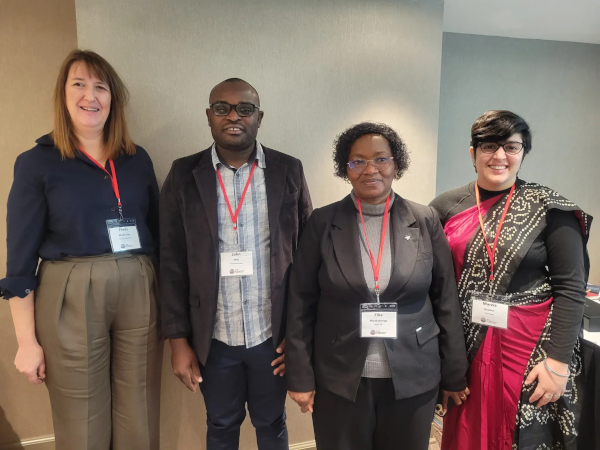
 KEY MILESTONES
KEY MILESTONES
- Empowering government school Urdu teachers through FOSS and OERs: In collaboration with Bengaluru North District Institute for Education and Training (DIET), we conducted workshops on creating OERs in Urdu for government school teachers. Approximately 75 teachers participated, learning to type in Urdu and translate stories into the language. Notably, over 25 teachers brought their personal laptops to have the Ubuntu Free and Open Source Software (FOSS) custom distribution installed. This workshop was a milestone for us, as it involved working with a cohort of teachers from an often underserved minority community.
- Critically assessed the impact of EdTech: We co-hosted the Critical Studies of Education and Technology (CSET) academic symposium in partnership with the Comparative Education Society of India. The symposium catalyzed the formation of the ‘Critical EdTech India’ community, bringing together educators, scholars, EdTech practitioners, and academics to examine technology in education through a critical, reflective, and ethical lens. The community intends to evaluate EdTech’s impact on equity, access, and policy to shape a more inclusive educational future.
- Examined barriers to language education: Through the action research project ‘Scaling of Teacher Professional Development’, we explored teachers’ challenges with language learning and techno-pedagogy, along with cluster resource persons’ (CRPs) struggles in providing academic support.
- At the Comparative and International Education Society (CIES) conference in Chicago, Illinois, we co-facilitated a workshop titled ‘Harnessing ICTs to Improve Equity in Teacher Professional Learning Systems’. We shared findings and guided activities demonstrating how framing technology as a resource—not just a product—in TPD is essential to enhance teacher agency.
- Broadened the discourse on AI in education: We participated in a conference of experts on the integration of AI in education, convened by the UN Special Rapporteur on the Right to Education, in Geneva. Our inputs, in this conference, on the Kerala Public EdTech model, were part of the report to the UN General Assembly, on human rights-based approaches to AI use in education.
- We deepened our engagement with emerging debates on AI in education, co-hosting a hybrid webinar titled ‘Generative AI in the Classroom – Possibilities and Perils’, in collaboration with the Vakkom Moulavi Foundation Trust (VMFT) and the Comparative Education Society of India (CESI).
- Advocated for democratization of digital resources: At a UNICEF event in Delhi, we moderated a panel on ‘Strengthening Digital Pedagogy to Improve Educational Outcomes’, highlighting the need to move beyond an isolated focus on providing digital devices to students.
- At the Tata Institute of Social Sciences (TISS) national conference on ‘Democratizing Digital: Creating Pathways for Impact’ in Mumbai, we delivered a presentation titled “Using Technology to Transform the Landscape of Education.” Our intervention underscored the need to move beyond mere translation of educational resources and instead strengthen teacher agency to co-create contextually grounded and pedagogically meaningful digital content.
 WHAT’S ON THE HORIZON?
WHAT’S ON THE HORIZON?
- Publishing research outputs, including a framework on ‘Stages of Teacher Engagement and Collaboration in Communities of Practice (CoPs)’.
- Conference on ‘Edtech for Equitable Education’, to explore how EdTech can be designed to support inclusive education, and avoid its potential for harm.
Recommendations from the Vault
- Watch the findings from our action research project, ‘Scaling of Teacher Professional Development (TPD) for English Language Learning’, during the launch of the ‘Embedding Gender Equality and Social Inclusion (GESI) in Research with Teachers: A Self-Assessment Framework’.
Gender and Digital Empowerment
Our gender and digital empowerment programs harness the power of participatory media technologies and community-controlled information systems to confront gender injustice and social exclusion. Hosa Hejje, Hosa Dishe (A New Step in a New Direction), our adolescent girls’ empowerment initiative, employs digital storytelling, social media, and school-based media hubs to strengthen girls’ agency, autonomy, and feminist solidarity. Prakriye, our field centre in Mysuru, builds and sustains a network of women-led civic information labs that provide public access to information, digital skills training, and media-supported grassroots dialogues, fostering intergenerational solidarity and community leadership.
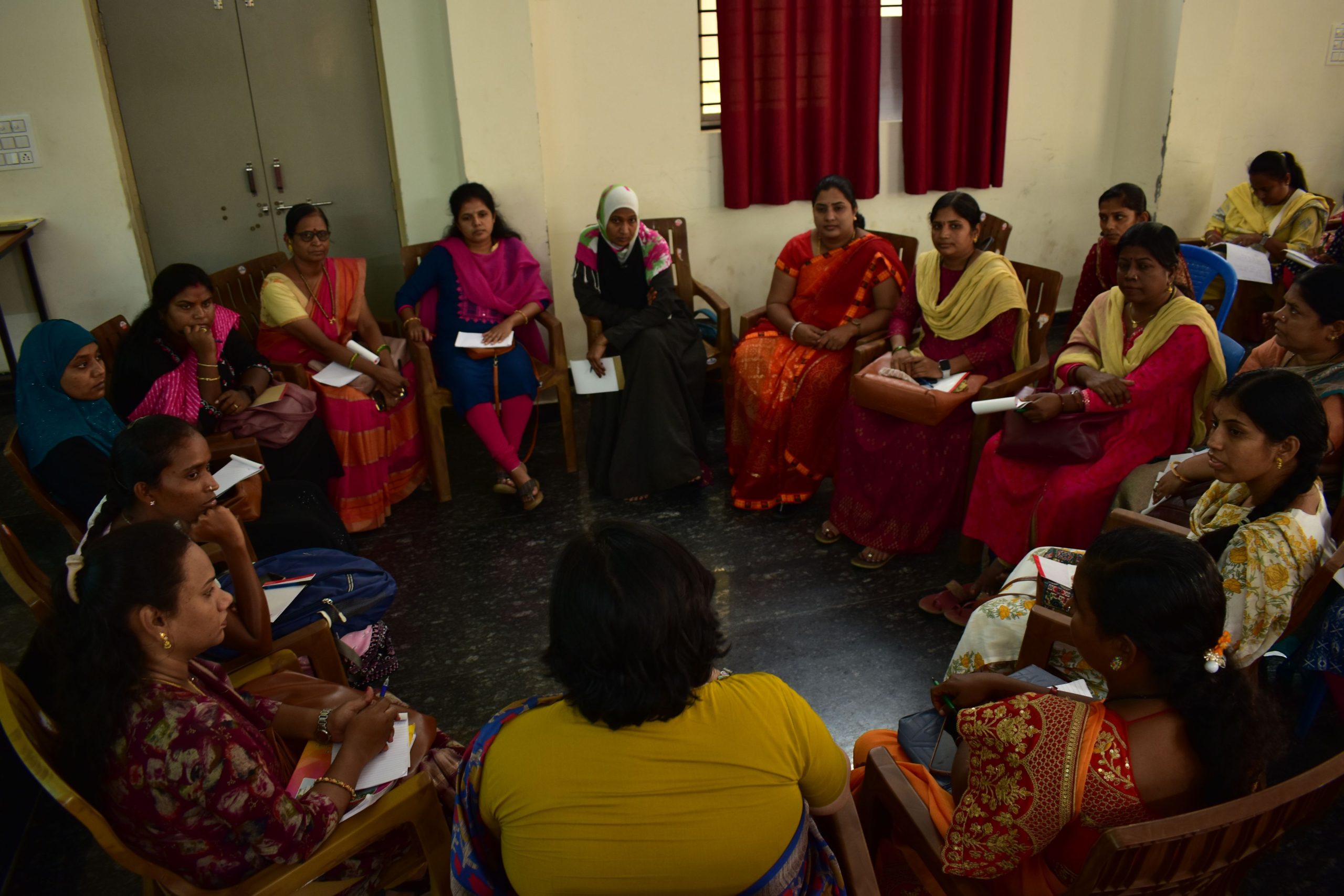
IMPACT AT A GLANCE
| 11,000+ | views in a week for our most successful social media campaign Kishori Kaiyalli Internet: Samasye Saaku, Sadhyate Beku |
| 227 | IVRS messages shared with parents of Kishoris in Kishori Clubs and members of women’s collectives in rural Mysuru |
| 1.7 lakh | views for Kishori Adda on Instagram |
| 10,900+ | views for the Hosa Hejje Hosa Dishe social media awareness campaign on overcoming stereotypes |
| 11,800+ | views for a campaign on understanding adolescence for empowerment |
| 820+ | claims and entitlements supported through Namma Mahiti Kendras |
| 1,500+ | community members informed about various government schemes |
| 45+ | film screenings held, reaching 636 women, men, and adolescents |
| 250+ | women participants in seven joint public meetings held among government departments |
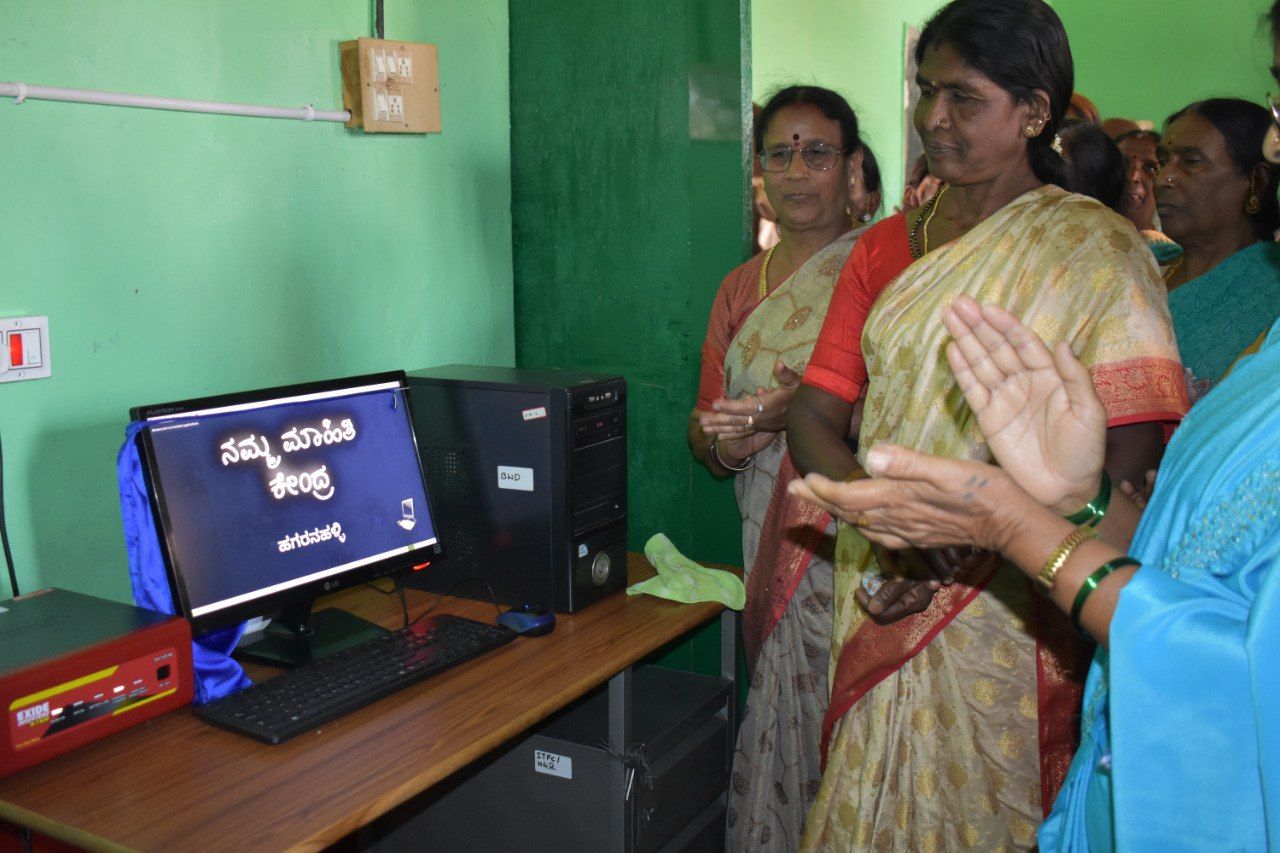
 KEY MILESTONES
KEY MILESTONES
- Fortified engagement with Kishoris: Our Kishori Clubs—school-level media hubs under Hosa Hejje, Hosa Dishe—now operate in four districts: Mysuru, Chamarajanagara, Kalaburagi, and Raichur, reaching 449 schools and nearly 19,000 students. Building on these awareness initiatives, we ran the social media campaign ‘Hadihareyava Ari Sabalatheye Ninna Guri Abhiyana’ (Understand Adolescence, Empower Yourself), which explored gender dynamics and sexual and reproductive health, reaching close to 14,000 viewers.
- Improved access to information for adolescent girls: At the Prakriye field center, we launched the Kishori Champions program in Mulluru and Jakkalli villages. Through digital storytelling and interactive modules, the program equips 40 adolescent girls (Kishoris) with knowledge on adolescence, gender, patriarchy, and cyber safety, while strengthening their leadership, life skills, and agency.
- Expanded career horizons through digital learning: To provide insights into diverse educational and career pathways beyond the 10th standard, we released the updated ‘Career Guidance for Adolescent Girl Empowerment’ MOOC. As many as 900 adolescents completed the course in the first month alone.
 PROGRAM METRICS
PROGRAM METRICS
| 68 | New information resources documented from government departments, NGOs, and skill training centers |
| 820 | Claims and entitlements facilitated through civic information labs |
| 1,500+ | Community members reached with timely information through direct outreach |
| 215 | IVR messages broadcast to 1,287 recipients (men and women) |
| 13 | Women and adolescent girls trained in digital literacy in Mullur village |
| 8 | Namma Maatu women’s forums sustained across five villages, engaging 88 women |
| 43 | Kishori champions trained in digital storytelling across two villages |
| 45 | Film screenings conducted for 636 community members |
| 7 | Public meetings with government department officials held, with 250+ women participants |
 WHAT’S ON THE HORIZON?
WHAT’S ON THE HORIZON?
- Expanding Kishori Clubs from four to eight districts and launching Kishori Champions workshops with enhanced curricula emphasizing creative expression through digital tools.
- Establishing 5G-enabled Namma Mahiti Kendras featuring ‘Dream Desks’, providing adolescent girls with contextual career guidance and digital opportunities.
- Conducting systematic village surveys to expand the network of women-led Namma Mahiti Kendras.
- Piloting a Free and Open Source Software (FOSS)-based Management Information System (MIS) app to track real-time center reach and impact.
Recommendations from the Vault
- Read this article, ‘Clubs Help Young Girls Navigate Their Way’, on how Kishori Clubs serve as a safe space for adolescent girls.
- Listen to this episode of Nan Voice Nan Choice podcast as Kishoris reflect on how they would make decisions as heads of the family.
